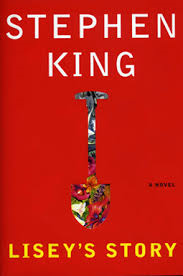Lisey's Story: (A Book Review)

Preface
Today we're taking a look at a novel by Stephen King: Lisey's Story. The volume I have in my hand is hardcover, published in 2006, by Scribner. It is about five-hundred-nine pages, not including the Author's Statement at the end.
For those of you who have never read a book review by me, let me tell you I do this a bit differently. I am merely going to give you my best analysis of what the book is, how it functions, what its trying to do. I'm just going to, briefly, reverse engineer the book for you, so that you can decide for yourself whether or not this novel is your cup of tea.
I usually do not have the temerity to criticize plot construction or character development, or anything like that. I give the authors the respect they deserve, as professionally published authors being "reviewed" by one such as me, an unpublished, amateur writer. And besides, such things like the execution of plot, character, and scenery are subjective author choices.
Those things are usually quite competently executed. It would take an extraordinarily severe display of obvious creative malpractice, therefore, for me to ever, in a book review, actually criticize such things as a professionally published author's plot construction and character development.
The nuts and bolts
As you know, Stephen King is a horror novelist and story writer. I should say that Lisey's Story is quite interesting, in that it functions on a dual track of both a work of "horror," per se, and one of what I call magical realism. Let me give some definitions, because I may use the terms horror and magical realism differently than you do.
Horror: For me this is a genre category in literature. When human beings are involved, I mean to say that an alternate reality is impressed upon human consciousness by a supernatural agency. A ghost haunts a house, for example. The ghost makes itself known, in a terrifying way to the living inhabitants of the house.
Magical Realism: For me, when human beings are involved, this involves an alternate reality which is made known to human consciousness by human agency. That is to say, human beings discover this alternate reality. The fact of human discovery of this alternate reality makes the "magic" "realistic."
Now, when I say that this novel is a "horror" story, I have to qualify that. There is a complication. As I said, when I call something "horror," I mean to say that an alternate reality is rather rudely made known to human consciousness by a supernatural agency, a being or monster from that alternate reality.
The "horror," per se, is supplied by the life story of Scott Langdon, one of the primary characters in the story, who is a best-selling novelist. It seems that madness runs in the Langdon family, and the Landreus before them.
Now then, the fact of congenital family "madness" is not necessarily the stuff of "horror" in literature. But we are talking about Stephen King, the "master of horror," as it were. So congenital madness is manipulated into something full of horror, indeed, by Mr. King.
Congenital "madness" manifests "horror," in this story, because this kind of insanity tends to turn people into literal homicidal maniacs, who have no compunction about targeting even their (formerly) closest loved ones.
Stay with me.
This madness, which turns people into homicidal maniacs, implies that either demonic or malevolent alien possession is at the back of it. This is certainly a familiar thrust of much of Stephen King's work. However, the interesting thing about Lisey's Story is that the monster is never unmasked, as it were.
What I'm saying is that while demonic or alien possession is implied, it is never confirmed. That is to say we never meet the monster or spirit or sinister entity as the source of the madness. As you know, as I have defined "horror," we require and entity who introduces the alternate reality to terrifying effect. And that is why I am somewhat equivocal in my application of the term horror to this novel.
This story functions on the magical realism track because of an alternate reality---complimenting the one with which we are so familiar---which is discovered by human beings. Scott Langdon discovered an alternate reality, which both provided a major source of creativity for his fiction, and allowed him to survive his horrific childhood.
I don't want to give too much away. Just know, for now, that this alternate reality is where the mind wanders off to, sometimes. This landscape is fascinating because you can be there in more than one way. Your mind alone might be there, while your body remains visible in this world. Or you might take both your mind and body there.
The Long Boy
There is a creature who inhabits this alternate reality, who is predatory and utterly terrifying. You will be tempted to ascribe this creature as the "monster unmasked." I would resist that assessment for two reasons.
First of all, the Long Boy is not the source the Langdon's family madness. The Long Boy has never intruded upon our own, normal human reality.
Second, the Long Boy is exclusively a predatory creature the alternate reality. And, as we have established, that alternate reality---discovered by a young Scott Langdon---is a component of magical realism.
The alternate reality world, discovered by Scott Langdon, is in many ways a beautiful, wondrous place. But it is also a place that has actual, specific rules, a mode of functioning, and dangers. The jungle is beautiful and breathtaking and dazzling, for example. There is much for the eye and the heart; but you cannot play around. You have to understand that there are certain places, in the jungle, where you should not be at certain times, and creatures who will kill you if you're not careful.
There are two more constituent aspects of this novel. Lisey's Story is thriller, as I define the term; and it is a crime story, as I define the term.
This novel is not a suspense tale, as I define the term, because you don't have a protagonist who has to accomplish something within a specific time-window. Let me say that, for me, "before its too late" doesn't cut it as "suspense."
This novel is a thriller, as I define the term, because you do have a building series of events which lead up to a "shattering conclusion," as it were.
This novel is not a mystery tale, as I define the term, because there is no whodunit puzzle to solve.
This novel is a crime tale, or has a crime tale component. That is because we meet the murderously psychotic, but still fully human and natural Jim Dooley. His identity is revealed to us fairly quickly and straightforwardly, so that there is little "mystery" there. His story is of the "crime" modality because the only real question is this: Will he get away with his cascading series of felonies?
The basic story
We find Lisey Debuscher Langdon as the widow of best-selling novelist, Scott Langdon. It is two years after Langdon died of pneumonia in the hospital.
They had been married and deliriously happy for twenty-five years. Lisey is still very much grieving after two years. She has yet to sort out her late husband's "literary estate." What institution(s) shall get Langdon's creative papers?
The "crime/thriller" tracks of this novel concern the psychopathic Jim Dooley. It seems that he had developed an obsession with the novels of Scott Langdon. Apparently, and amazingly, he seems to have found himself in a bar, one evening, talking to a professor of literature, who, truth be told, has his own obsession with the work of the late Scott Langdon. It seems that they were both drunk.
Dooley seems to have come away from that encounter in the belief that he had been "hired" by the professor to, vaguely, somehow, get Lisey to donate her late husband's creative papers to this particular professor's university. More distressingly, Dooley's impression seems not to have been entirely without foundation.
Finally, the "horror"/magical realism tracks play out in the form of the review of Scott Langdon's life, the challenging childhood he endured, and how he coped with it.
You know what? I think that will do it.
Thank you for reading!





